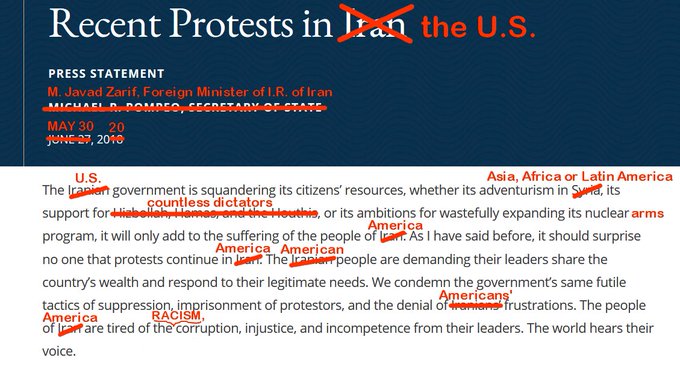RFL/RE – Iran is using the killing in the United States of an African-American man at the hands of a white policeman and the angry wave of protests it has caused as a propaganda tool to settle scores with Washington, which has imposed a campaign of “maximum pressure” on Tehran that includes crippling economic sanctions.
Iranian officials have denounced the killing of the man, George Floyd, in the city of Minneapolis on May 25 while using the same rhetoric Washington has used in recent months to blast state corruption and human rights abuses in Iran.
On June 1, Iranian Foreign Ministry spokesman Abbas Musavi made a rare statement in English to directly appeal to Americans and express support for what he termed their “outcry over state oppression” in protesting Floyd’s death.
“To the American people: the world has heard your outcry over [state] oppression. The world is standing with you. The American regime is pursuing violence and bullying at home and abroad,” Musavi said.
Musavi also called on U.S. officials and the police to stop using “violence” against Americans and to “let them breathe.”
The comments echoed statements issued by top U.S. officials in support of Iranians who took to the streets in recent months, including in January following the downing of a Ukrainian passenger jet by the Islamic Revolutionary Guards Corps (IRGC).
The influential IRGC said the tragic accident was caused by human error amid heightened tensions with the United States after the assassination of the corps’ top commander, Qasem Soleimani. But the government initially denied involvement in the plane’s downing, angering Iranians.
Both U.S. President Donald Trump and Secretary of State Mike Pompeo expressed support for the protesters outraged by the incident, which killed 176 people.

Trump posted a tweet in English and Persian saying that his administration stood with the Iranian people. He added that “we are following your protests closely and are inspired by your courage.”
For his part, Pompeo said that Iranians “are fed up with the regime’s lies, corruption, ineptitude, and brutality of the IRGC under @Khamenei_ir’s kleptocracy.”
On May 30, Iran’s Twitter-savvy foreign minister, Mohammad Javad Zarif, posted a 2018 statement by Pompeo where some of the words had been crossed out and replaced with new words in red to reflect Tehran’s views and highlight the outbreak of protests in 140 cities around the United States.

Some don’t think #BlackLivesMatter.
To those of us who do: it is long overdue for the entire world to wage war against racism.
Time for a #WorldAgainstRacism.

14.2K6:23 PM – May 30, 2020Twitter Ads info and privacy7,592 people are talking about this
“The people of America are tired of the racism, corruption, [and] incompetence from their leaders,” Zarif’s statement said, adding that “the American people are demanding their leaders share the country’s wealth and respond to their legitimate demands.”
“Some don’t think #BlackLivesMatter,” Zarif said on Twitter, which is among the social-media platforms banned in Iran, although top government officials are allowed to use it.
Pompeo retorted back with the tweet: “You hang homosexuals, stone women and exterminate Jews.
Iranian Vice President Massumeh Ebetkar, who was the spokeswoman for the hostage-takers of U.S. diplomats in Tehran following the 1979 Islamic Revolution, retweeted a story about the protests in the United States while writing that “All humanity stands with you against racism, against discrimination, against oppression, against imperialism!”
There was also condemnation from the head of Iran’s judiciary, hard-line cleric Ebrahim Raisi, who is accused of having played a key role in the 1988 mass executions of thousands of political prisoners following mock trials that often lasted just a few minutes.
“Today America is not a claimant [as a purveyor of] human rights anymore, but as an accused it should face trial,” said Raisi, who has been blacklisted by the U.S. Treasury, in a speech aired on state-controlled television.
Iran routinely crushes antiestablishment protests, including in November 2019, when at least 300 people were killed during street demonstrations, according to Amnesty International. Many of the victims were reportedly shot dead by snipers.

Other critics, including U.S. Special Representative for Iran Brian Hook, have said that more than 1,000 people may have been killed by security forces in those protests, which were sparked by a major hike in gasoline prices.
Iran’s heavily censored media, which is often banned from reporting on anti-government rallies, has covered the protests in U.S. cities on their front pages and led their news broadcasts with them.
Iranian media reported earlier this week that a candlelight vigil was held in the city of Mashhad for Floyd, who died after a policeman kneeled on the back of his neck for nearly nine minutes, pinning him facedown in a city street. Floyd repeatedly told the officer that he could not breathe. The police officer has been arrested and faces murder charges. Three other police who helped detain Floyd and failed to help him during the incident were fired.
The vigil in Iran for Floyd is notable because Iranian officials do not usually allow public memorials for victims of state violence.
In December, family members of Pouya Bakhtiari, a young protester killed in the November street protests that spread to more than 100 cities and towns, were detained after announcing they would hold a public ceremony to mark 40 days since his death.
Security officials reportedly summoned Bakhtiari’s father and told him not to hold the ceremony in a mosque, citing concerns it could create unrest.
- Golnaz EsfandiariGolnaz Esfandiari is a senior correspondent with RFE/RL.
 Shabtabnews In this dark night, I have lost my way – Arise from a corner, oh you the star of guidance.
Shabtabnews In this dark night, I have lost my way – Arise from a corner, oh you the star of guidance.


